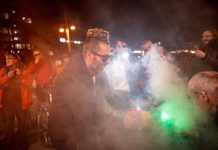Millions of people in the world of social media posted “Je suis Charlie” (“I’m Charlie”), identifying with the slogan which in itself hides the message “I’m free, I’m not afraid”.
The phrase “I’m Charlie” is the work of artist Joachim Roncin, who shortly after the attack on his Twitter account published the now famous photograph, on which the slogan is inscribed with the font of the Paris satirical magazine. It became the most posted photography on the social networks.
More than 50 French, one Australian and one Belgian tried to patent the photograph and the slogan.
24 hours after last week’s tragic events in Paris, Belgian businessman Yannick Uterhagen filed a request for protection of the phrase for using on cleaners, toilet chemicals, paper products, clothing, games, drinks, advertisements and telecommunications.
Australian Greta Grosberg, who is behind the company for accessories “Fastlink”, filed a request to patent the two phrases “Je suis Charlie” (“I am Charlie”) and “Charlie Hebdo” a week after the attacks in Paris in which 17 people were killed.
Grosberg confirm for the newspaper “Australian” that she filed a patent request and said she was surprised that some consider her actions offensive. She said that she doesn’t have any special plans how she will use the copyrighted phrases.
Roncin is disgusted by such attempts and said that only one organization, NGO “Reporters Without Borders”, received permission to use his photo. He already consulted lawyers to stop commercial use of the slogan.
– The very thought that the slogan which is full of so much hope, is to be proprietary, is horrific. I want this message to stay pure. Four million people on the streets of Paris shouted this message. It was shouted in the streets of London, New York and allover the world. I will be appalled if someone tries to cash in on the slogan – says Roncin.
Experts on patent law are divided about such requests. Some of them believe that the requests will be rejected as contrary to public policy and accepted moral principles of the Directive on trademarks. However, according to some experts, unlike other trademarks which are directly related to tragedies, this slogan has nothing derogatory or offensive. They note that the slogan has a positive connotation, represents a reflection of the freedom of expression and is a product of the movement for the protection of freedom of speech and the fight against terrorism, which grew after the tragic events.



















![Young people in a three-day-workshop learned about data visualization [Gallery]](https://meta.mk/wp-content/uploads/2023/12/obuka-za-vizuelizacija-na-podatoci-vo-dekemvri-2023--100x70.jpg)




